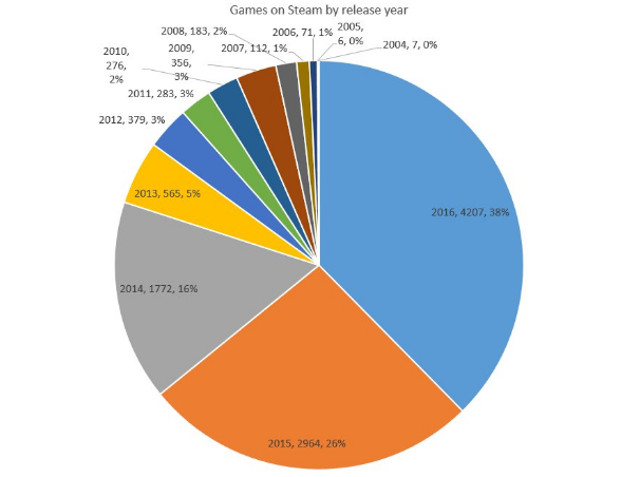2016 seemed like a perfectly normal year. There were good games, bad games, games that disappointed, games that surprised us, and just enough of them that we never fell out of love with our favorite pass time. However, in the case of Steam, it was far from an ordinary year.
As detailed by Steam Spy, the Steam platform saw the introduction of 4208 games this year. Not only is that way more than any other platform, but it broke records for Steam. In contrast, 2964 games released on Steam in 2015, and 2014? Just 1772.
In other words, 38% of all Steam games were released in the past 12 months.
This unequaled avalanche of game releases might have meant that PC gamers had more options than ever before, but even then it wasn't necessarily a good thing. These records were made possible by the failing of Valve's approval process, including Steam Greenlight. Its quality control for releases is close to being completely unmoderated, resulting in even the most disingenuous releases finding their way onto the store, alongside noteworthy titles like Civilization VI and XCOM 2.

What this means more than anything is that user reviews are more important now than ever. PC gamers in particular are susceptible to the difficulties of weeding through a great variety of software options and inaccurate marketing. In the interest of avoiding buyer's remorse, it's vital that Steam users are able to communicate their satisfaction or dissatisfaction in an easy and articulate manner. Valve recognizes this, and made an effort to revamp its review process just a few weeks ago.
That review process revamp resulted in up to a 74% drop of review scores for games within the Steam Store, a result that made clear just how much of a problem review manipulation has been.
Many complaints have been made regarding Valve's leniency with vetting of game releases. However, it doesn't appear to be interested in making any modifications for the time being. Some have argued that this is because even the most unattractive and perhaps offensive games are capable of bringing in serious cash flows for Valve, thanks in-part to Steam Cards which make every game that supports them valuable to a large number of Steam users no matter how bad the game.
Do you think that having more games available, even if they're unfiltered, is the best way to go? Let us know what you think in the comments below.







